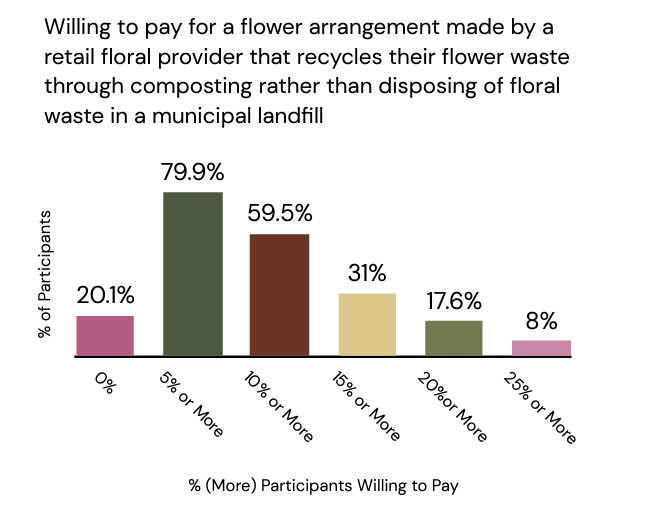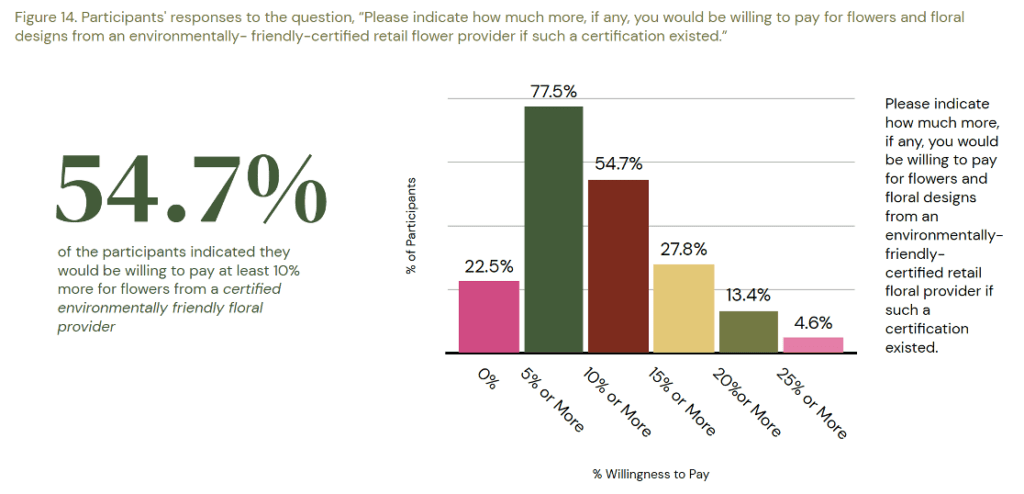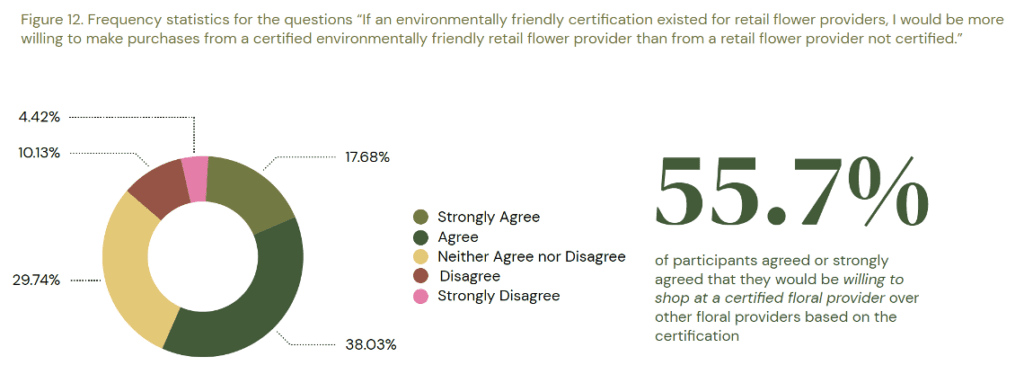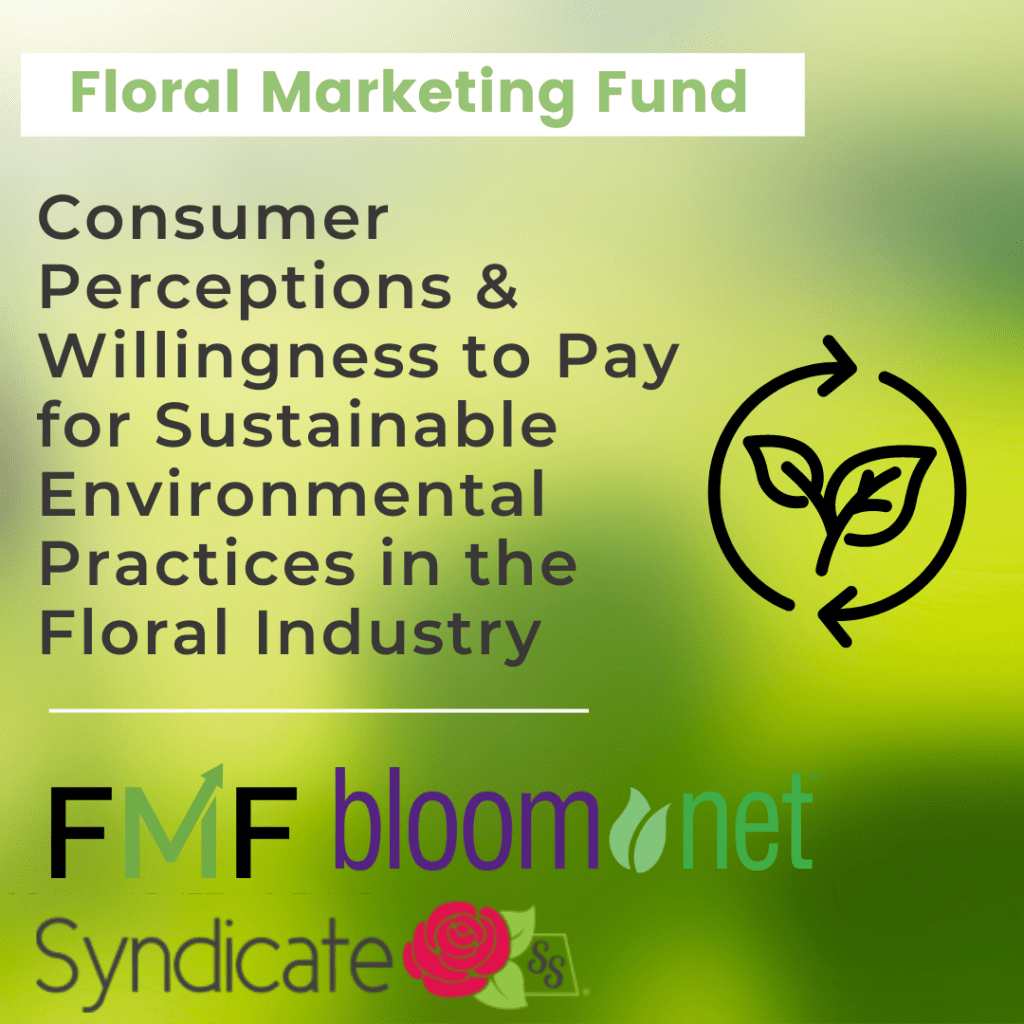Environmentally-Focused Customers: What This Means for Florists

Customers are willing to pay more to buy from florists who are environmentally focused, according to a consumer study.
Consumers are keeping sustainability in mind, with more than half of participants in a recent study indicating their willingness to pay an additional 10% or more for products with sustainable attributes, including whether stores offer locally sourced, organic, or fair-trade flowers, whether they compost their organic waste, and whether they deliver flowers in multi-use materials, such as reusable vases.[SL1]
This and many more insights were shared in a consumer research study released in June, U.S. Consumer Perceptions & Willingness to Pay for Sustainable Environmental Practices in the Floral Industry, which was led by researchers at Mississippi State University and the Texas State University.
This project was funded by the Floral Marketing Fund alongside co-sponsor BloomNet®, a floral services company within the 1-800-Flowers.com family, and Syndicate Sales, a supplier of floral hard goods for retail florists.

“With more than 5,000 local florists in its network, the BloomNet floral services company is always looking for consumer data that will help its thousands of floral providers connect with and better serve their customers,” said Renato Sogueco, Vice President of Digital Strategy and Education for BloomNet. “The primary purpose of this study was to gain an understanding of consumer perceptions as they relate to retail floral providers’ sustainable and environmentally friendly practices.”
The study collected data through an online survey providing a sample of over 2,000 responses that align closely with that of the overall demographics of the U.S. Participants were asked to rank the list of environmental attributes from most important to least important, showing which sustainable practices matter the most to each consumer group.
Key findings include insights into consumers’ willingness to make purchases and pay additional costs for flowers from retailers practicing sustainability within their businesses. Additionally, the study broke down respondents by age, education, income, gender, and ethnicity to give more detailed insights for retailers to use when considering their target customer base.
“Retailers will be able to use these findings to better promote their sustainable practices to consumers in ways that the consumers want to see,” said Sogueco.

Below are some of the key findings from the study:
- The majority of participants (58.43%) agreed or strongly agreed that it’s the environmentally right choice to make purchases from a floral provider that is environmentally friendly when compared to one that is not.
- The majority of participants (61.42%) agreed or strongly agreed they would be more willing to make purchases from an environmentally friendly floral provider when compared to one that is not.
- Participants indicated they were most willing to make purchases from a floral provider that uses locally sourced flowers when compared to floral providers that do not, followed closely by floral providers that recycle their floral waste through composting.
- 50% or more of the participants indicated a willingness to pay 10% or more for all the sustainable attributes they were asked about.
- Participants indicated the strongest willingness to pay 10% or more for locally sourced flowers (61.7% of all participants), followed by floral providers composting their floral waste (59.5% of all participants).
- Of the total survey population, 31.7% indicated a willingness to pay 15% or more for locally-sourced flowers as well as for floral providers that compost floral waste (31.0%). While consumers ranked organic flowers as the third most preferred attribute, they appear less willing to pay 10% or more for these flowers when compared to other environmentally friendly attributes.
- Consumers were least willing to pay additional charges for organically grown flowers and fairtrade sourced flowers, with 27.5% and 26.7% of total participants, respectively, indicating they would not pay any additional increase in price for these attributes.
- Overall, participants found reasonable prices to be the most important aspect when deciding when to make a floral purchase.
- The phrase “locally sourced” is potentially an important key word for consumers when deciding where to make a floral purchase.
- When the phrasing “locally sourced” is removed from answer options, participants indicate the most important sustainable aspect to be “Materials (other than flowers) used in floral design, are sustainable, recyclable, upcyclable, reusable.”
- Participants indicated not only are they more willing to shop at a certified environmentally friendly floral provider when compared to a floral provider that has no certification, but they would trust a certified floral provider's environmental standards based on the certification.


Source Material
- FMF Homepage: https://floralmarketingfund.org/
- The full study link: https://floralmarketingfund.org/product/sustainable-practices/
- Press Release On Site: https://floralmarketingfund.org/new-consumer-research-released-on-sustainable-practices-in-the-floral-industry/ (released 6/15)
